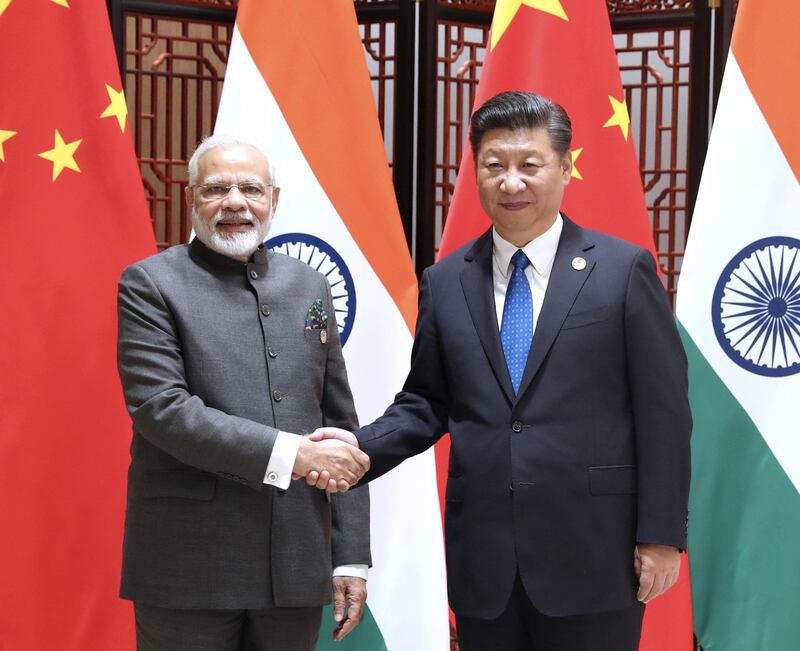Last week in Xiamen, China, the Chinese government rolled out the red carpet for the leaders of the Brics countries. There were banquets and musical galas and a host of announcements of new cooperation between Brazil, Russia, India, China and South Africa. A special focus was put on efforts to smooth over tensions between China and India that had recently flared in the Doklam region in the Himalayas along the border between the two countries. A statement was issued following the meeting between Chinese president Xi Jinping and India's prime minister Narendra Modi, underscoring both sides agreement that the relationship was important and that every effort should be made to improve it. Importantly, the meeting ended with a joint statement condemning terrorism that, in a victory for the Indians, specifically called out several Pakistani-based terrorist organizations.
But beneath the shiny surface of the event, beyond the photo ops and the carefully worded communiques, there was another question hanging over the meeting, one that asked what the group must look like and how it must adapt if it was to remain relevant.
This was the ninth official summit of the Brics group, following a decision to begin high-level collaboration among these top emerging powers in 2008 on the periphery of the UN General Assembly. The group originally included just Brazil, Russia, India and China, consistent with the original formulation of the idea of BRICs, which was floated in 2001 by Jim O’Neill of Goldman Sachs. South Africa joined the group in 2010. More recently, the meetings of the Brics have included the involvement of other observer emerging countries as the group has sought to increase its influence as the voice of the rising powers of the world. This year, the Chinese invited Thailand, Tajikistan, Mexico, Kenya and Egypt as guests. Mr Xi said at the meeting: “We should get more emerging market and developing countries involved in our concerted endeavors for cooperation and mutual benefits.”
Clearly, part of the motivation behind the Chinese effort (and similar efforts at past meetings) was to turn the Brics meeting into a kind of a successor to the non-aligned movement of half a century ago. The underlying idea that the global south and more broadly those nations who were not the big developed powers in the international system, would have more clout if they were organised and lining up behind the most influential emerging powers seemed a good organizing principle around which to create such a successor network. That Russia was one of the world's two super-powers during the Cold War era or that China or India have long histories as major global powers seems to compromise the "purity" of this concept a bit, but geopolitical pragmatism has a tendency to forgive the bending of definitions when it suits the players.
_____________________
More from David Rothkopf
[ The old power relationships are fading. Welcome to the new world ]
[ Why the North Korea crisis has serious implications for the Middle East ]
_____________________
The bigger problem with the idea is this. Things did not exactly pan out as Jim O’Neill envisioned, which he first framed the Brics as the world’s most important emerging markets. Brazil, after a growth spike and raised hopes that it had finally turned a corner, crashed economically and is now embroiled in a web of political scandals that has caught up its two most recent presidents and literally scores of leaders from the Brazilian political and business communities. Its trajectory is no longer upward by any stretch of the imagination. Russia has struggled economically. Analysts expect growth this year of around 1.7 per cent and is not seen as a major economic force of tomorrow by any analyst anywhere. And South Africa, invited to join the group to ensure there was a player in Africa, never belonged in the mix anyway. I have just returned from that country – and it is a beautiful place with extraordinary people – but its 2017 growth rate estimates have been cut to around 0.5 per cent, its debt was cut to junk ratings earlier this year by Fitch Ratings and the economy is widely regarded to be in deep need of structural reforms.
China remains an economic leviathan, even when it falters. And while having an economy one-fifth the size of China’s, India – soon to be the world’s most populous country and the planet’s largest democracy – is still growing at a fairly respectable rate of around 6 per cent a year. They belong in a grouping of the world’s most important emerging economies. But everyone else’s membership in the group is compromised by the facts of their struggles.
In fact, while Mr Xi promoted the idea of Brics Plus in Xiamen, the reality is that the idea of the group has become obsolete, overtaken by events. What we really are seeing is the emergence of the ChIPs – which stands for China and India Plus. Those two states are and will be the dominant factors among the nations of the emerging world and uncomfortable though they may sometimes be in that partnership, it will likely be their destiny to increasingly play a leading role among all states both in their own right and as leaders of the rising powers of tomorrow.
David Rothkopf is CEO of The Rothkopf Group, a columnist for the Washington Post, a visiting scholar at the Carnegie Endowment for International Peace and most recently author of The Great Questions of Tomorrow





